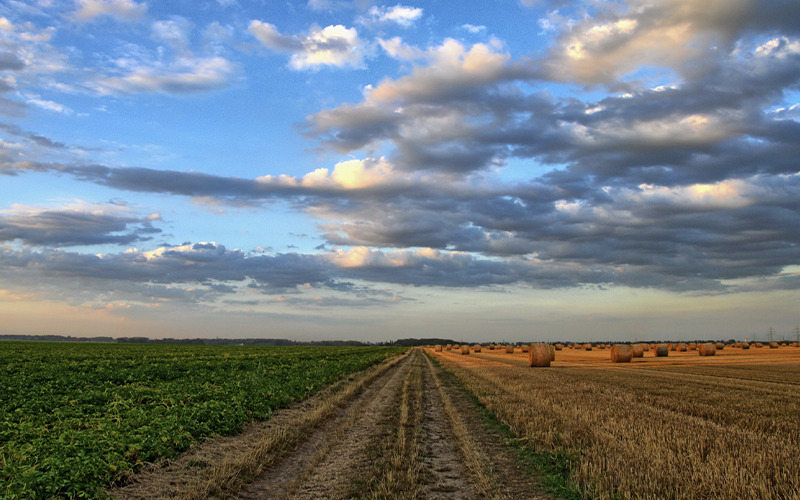Revealing the interactions between global biodiversity change and human food security (BIOTA)
BIOTA is a NERC-funded research collaboration between UCL and other partners to reveal the interactions between global biodiversity change and human food security.

10 June 2021
Key facts
- Funding body: NERC
- Collaborators: Senckenberg BIK-F (Project Partner); Swansea University, United Kingdom (Project Partner); University of Cambridge, United Kingdom (Project Partner); NASA, United States (Project Partner)
- Duration of project: October 2018 to October 2022
Overview
The BIOTA project focuses on evaluating and explaining the interactions between food production and biodiversity. Additionally, we will be quantifying the role of trade linkages in shaping the impacts of food production on biodiversity globally.
In order to effectively progress towards the Sustainable Development Goals, it is necessary to understand the interactions between biodiversity changes and human food security. Agricultural land use and land-use change are some of the largest pressures on biodiversity. However, biodiversity changes may also impact food production as many different species provide important ecosystem services that support agriculture.
In this project, we aim to advance biodiversity models to explain the interactions between biodiversity change and food production at a global scale.
We will also investigate how global trade in agricultural products is linked to biodiversity change, to identify where food consumption has particularly strong biodiversity impacts. We will be measuring the impacts of both trade-related land use and climate change on biodiversity. We will be asking how consumption footprints have changed over time and whether biodiversity impacts have decoupled from GDP and/or population growth. We will also compare biodiversity footprints to socioeconomic footprints to identify trade-offs and synergies with respect to sustainable trade policies that align with multiple SDGs, not just environmental goals.
Finally, we will make future predictions to identify the pathways of development in human societies and how these interact with biodiversity. We plan to look at scenarios of future land use and future consumption.
Impact, influence and outreach
Our results will feed into international processes through established links forged by the project’s Principal Investigators Tim Newbold and Carole Dalin. Biodiversity-focused processes include the Intergovernmental Platform on Biodiversity & Ecosystem Services (IPBES), the Convention on Biological Diversity’s Global Biodiversity Outlook, and the United Nations Global Environment Outlook. In this regard, we will work with the UN Food and Agriculture Organisation (FAO) via the United Nations Sustainable Development Solutions Network (SDSN). Our previous modelling work has already produced indicators that are used by many of these processes, including IPBES and SDSN.
To inform national policy, we are working with the policy team at the Royal Society, who work with the UK government on issues around sustainable food security, with the International Institute for Environment and Development (IIED), whose work informs national policies in developing countries, and with the Sustainable and Healthy Food Systems (SHEFS) Project, which is working with national policy partners in the UK, India and South Africa.
- Outputs
- Ortiz, A. M. D., Outhwaite, C. L., Dalin, C., & Newbold, T. (2021). A review of the interactions between biodiversity, agriculture, climate change, and international trade: research and policy priorities. One Earth, 4(1), 88–101. https://doi.org/10.1016/j.oneear.2020.12.008
- Ortiz, A. M. D., & Torres, J. N. V. (2020). Assessing the Impacts of Agriculture and Its Trade on Philippine Biodiversity. Land, 9(11), 403. https://doi.org/10.3390/land9110403
- Soroye, P., Newbold, T., & Kerr, J. (2020). Climate change contributes to widespread declines among bumble bees across continents. Science, 367(6478), 685–688. https://doi.org/10.1126/science.aax8591
- Dalin, C. & Outhwaite, C.L. (2019) Impacts of Global Food Systems on Biodiversity and Water: The Vision of Two Reports and Future Aims. One Earth, 1, 298–302. doi: 10.1016/j.oneear.2019.10.016
- People
- Carole Dalin (PI)
- Monica Ortiz
- Elizabeth Boakes
- Tim Newbold (UCL CBER)
- Charlie Outhwaite (UCL CBER)
- Collaborators
- Senckenberg BIK-F (Project Partner)
- Swansea University, United Kingdom (Project Partner)
- University of Cambridge, United Kingdom (Project Partner)
- NASA, United States (Project Partner)
 Close
Close

